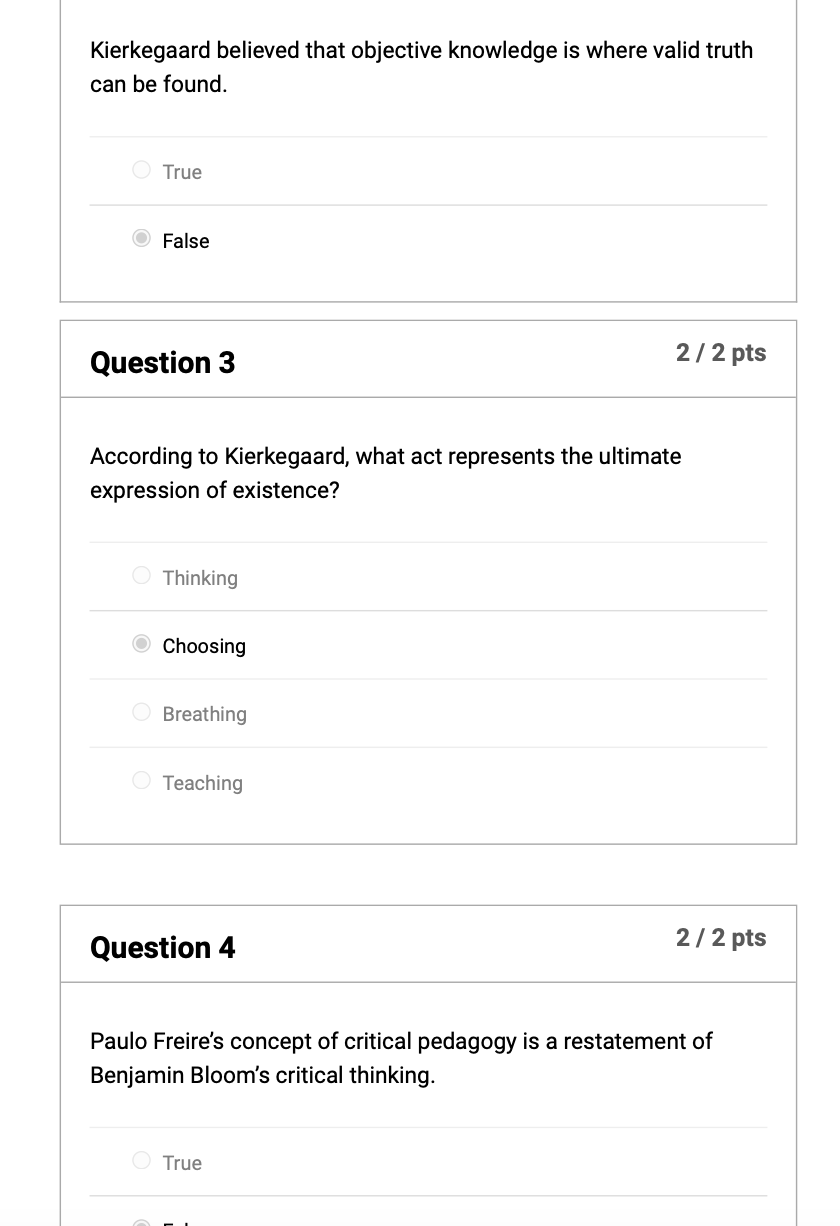EDUC 703 Quiz Postmodernism
EDUC 703 Quiz Postmodernism & Religious Rights
- According to Kierkegaard, one chooses to be an authentic self by taking a leap of faith.
- Kierkegaard believed that objective knowledge is where valid truth can be found.
- According to Kierkegaard, what act represents the ultimate expression of existence?
- Paulo Freire’s concept of critical pedagogy is a restatement of Benjamin Bloom’s critical thinking.
- Match the description to the corresponding term. Stimulus-response system of conditioning students. Recursive and interactive relationship between theory and practice. Students are treated as recipients of facts given to them by their teachers. Awareness of oppression.
- Paulo Freire’s critical pedagogy has theoretical roots in Marxism.
- To which educational theory would Freire’s critical pedagogy be least similar?
- In the 1962 Engel v. Vitale decision, the Supreme Court ruled that school personnel, in their official capacity when students are compelled to be present, cannot lead students in expressions of religious rituals.
- Based on judicial precedence, students may not . . .
- Based on judicial precedence, teachers may not . . .
- SHORT ESSAY: Choose one of the options below. Respond in a brief essay of one or two paragraphs (8 points). OPTION 1: Explain the prominent role of choice in Kierkegaard’s theory. OPTION 2: Many educators relate the word praxis to a series of teacher licensure exams. The term, however, has a distinct meaning in the philosophy of education. Explain how the term is used in liberation theology and in critical pedagogy. OPTION 3: Explain what Freire meant by “culture of silence.” What are the implications of this culture for schools, students, and society?
Other sets
- According to Kierkegaard, one chooses to be an authentic self by taking a leap of faith.
- Kierkegaard believed that objective knowledge is where valid truth can be found.
- According to Kierkegaard, what act represents the ultimate expression of existence?
- Paulo Freire’s concept of critical pedagogy is a restatement of Benjamin Bloom’s critical thinking.
- Match the description to the corresponding term. Stimulus-response system of conditioning students. Recursive and interactive relationship between theory and practice. Students are treated as recipients of facts given to them by their teachers. Awareness of oppression.
- Paulo Freire’s critical pedagogy has theoretical roots in Marxism.
- To which educational theory would Freire’s critical pedagogy be least similar?
- In the 1962 Engel v. Vitale decision, the Supreme Court ruled that school personnel, in their ocial capacity when students are compelled to be present, cannot lead students in expressions of religious rituals.
- Based on judicial precedence, students may not . . .
- Based on judicial precedence, teachers may not . . .
- OPTION 1: Explain the prominent role of choice in Kierkegaard’s theory.
OPTION 2: Many educators relate the word praxis to a series of teacher licensure exams. The term, however, has a distinct meaning in the philosophy of education. Explain how the term is used in liberation theology and in critical pedagogy.
OPTION 3: Explain what Freire meant by “culture of silence.” What are the implications of this culture for schools, students, and society?
